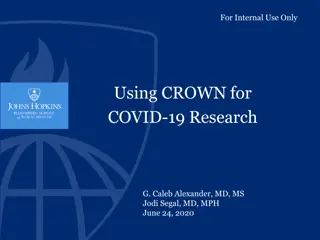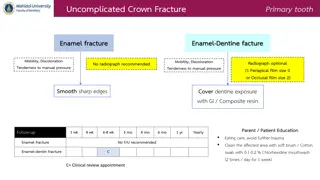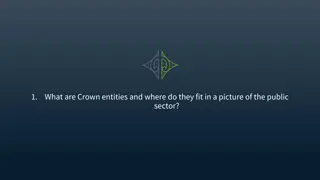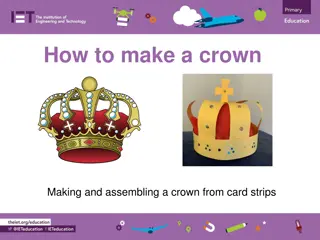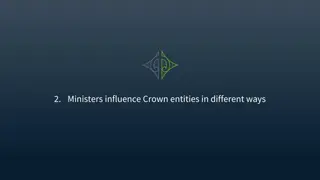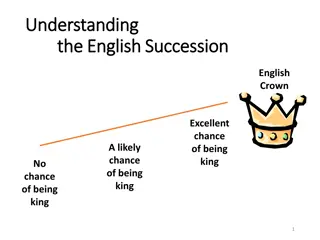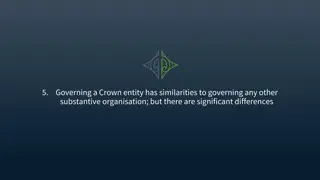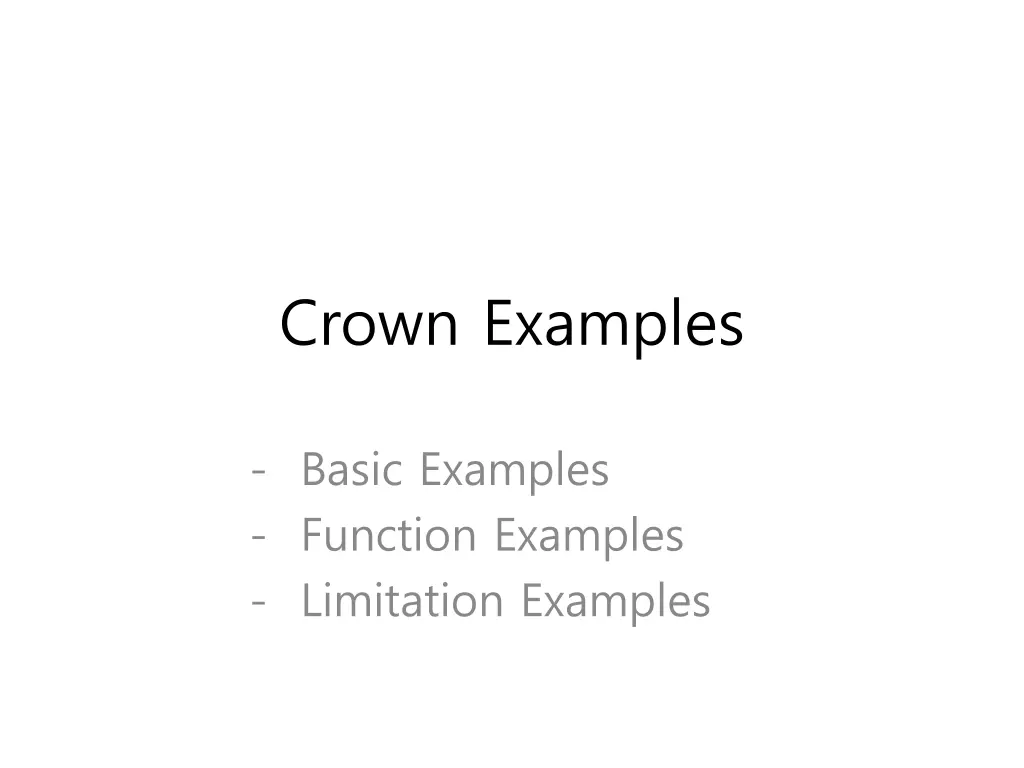
Explore Crown Programming: Basic Examples and Limitations
Dive into the world of Crown programming with basic examples showcasing symbolic variable definition, arithmetic operations, conditional statements, and constraints handling. Understand the limitations and capabilities of Crown through practical code snippets and demonstrations.
Download Presentation

Please find below an Image/Link to download the presentation.
The content on the website is provided AS IS for your information and personal use only. It may not be sold, licensed, or shared on other websites without obtaining consent from the author. If you encounter any issues during the download, it is possible that the publisher has removed the file from their server.
You are allowed to download the files provided on this website for personal or commercial use, subject to the condition that they are used lawfully. All files are the property of their respective owners.
The content on the website is provided AS IS for your information and personal use only. It may not be sold, licensed, or shared on other websites without obtaining consent from the author.
E N D
Presentation Transcript
Crown Examples - Basic Examples - Function Examples - Limitation Examples
Basic Example 1 // Hello Crown example. // This example shows how to define a symbolic variable. #include <crown.h> // for Crown #include <stdio.h> int main(){ int x; SYM_int(x); // Define x as a symbolic input. printf("x = %d\n", x); if (x > 100){ printf("x is greater than 100\n"); }else{ printf("x is less than or equal to 100\n"); } return 0; } ------------------------- x = 0 x is less than or equal to 100 ------------------------- x = 101 x is greater than 100
Basic Example 2 // Hello Crown example 2 with initial value assigned to // a symbolic variable using SYM_int_init. #include <crown.h> #include <stdio.h> int main() { int x; SYM_int_init(x, 7); printf("x=%d\n", x); if ( x > 10) printf("x>10\n"); else printf("x<=10\n"); } ------------------------- x=7 x<=10 ------------------------- x=11 x>10
Basic Example 3 // Another Hello Crown example. // Crown can handle linear integer arithmetic expression // and nested condition statements #include <crown.h> #include <stdio.h> int main() { char x, y; SYM_char(x); SYM_char(y); printf("x, y = %d, %d\n", x, y); if (2 * x == y){ if (x != y + 10) printf("Fine here\n"); else printf("ERROR\n"); } return 0;} ------------------------- x, y = 0, 0 Fine here ------------------------- x, y = -10, -20 ERROR ------------------------- x, y = -128, 0
Basic Example 4 // Symbolic value propagation example. // In an assign statement, if RHS has a symbolic variable, // a variable in LHS becomes a symbolic variable #include <crown.h> #include <stdio.h> int main(){ int x, y; SYM_int(x); printf("x = %d\n", x); y = 2 * x + 3; // y == 2 * x + 3 if (y == 7) printf("y(=2x+3) is 7\n"); /* if(y ==7) */ else printf("y(=2x+3) is NOT 7\n"); } ------------------------- x = 0 y(=2x+3) is NOT 7 ------------------------- x = 2 y(=2x+3) is 7
Basic Example 5 // SYM_assume() to give constraints on symbolic variables. #include <crown.h> #include <stdio.h> #include <assert.h> void main() { int x, y; SYM_int(x); SYM_int(y); SYM_assume( x + y > 10); printf("x=%d, y=%d\n", x, y); assert( x + y > 10); } ------------------------- ### SYM_assume(x + y > 10) is violated at Line 10 (main in basic-example5.c) ### ------------------------- program command is basic-example5 x=11, y=0
Basic Example 6 (1/3) // Long symbolic path formula // generated due to a loop #include <crown.h> #include <stdio.h> T C x Sym Path Formula Mdified symbolic pat h formula S o l 1 2 3 1 0 2 1 3 2 !(0<x) 0<x && !(1<x) 0<x && 1<x && !(2<x) 0<x && 1<x && 2<x && !(3<x) 0<x && 1<x && 2<x && 3<x 0< x 0<x && 1<x 0<x && 1<x && 2<x 0<x && 1<x && 2<x && 3<x COMPLETED int main(){ int i, x; SYM_int(x); printf("x=%d\n",x); 4 3 4 5 4 for (i=0; i < x; i++) { printf("i=%d\n",i); if ( i == 3) { printf("i==3 finally\n"); break; } } } // use print_execution to print a // symbolic execution path formula
Basic Example 6 (2/3) // Long symbolic path formula // generated due to a loop #include <crown.h> #include <stdio.h> Another sequence of solutions generated T C x Sym Path Formula Mdified symbolic pat h formula S o l 1 4 3 int main(){ int i, x; SYM_int(x); printf("x=%d\n",x); 1 2 3 0 1 4 !(0<x) 0<x && !(1<x) 0<x && 1<x && 2<x && 3<x 0< x 0<x && 1<x 0<x && 1<x && 2<x && !(3<x) for (i=0; i < x; i++) { printf("i=%d\n",i); if ( i == 3) { printf("i==3 finally\n"); break; } } 4 3 0<x && 1<x && 2<x && !(3<x) 0<x && 1<x && !(2<x) 0<x && 1<x && !(2<x) COMPLETED 2 5 2 } // use print_execution to print a // symbolic execution path formula
Basic Example 6 (3/3) ------------------------- x=0 ------------------------- x=1 i=0 ------------------------- x=4 i=0 i=1 i=2 i=3 i becomes 3 finally ------------------------- x=3 i=0 i=1 i=2 ------------------------- x=2 i=0 i=1 // Long symbolic path formula // generated due to a loop #include <crown.h> #include <stdio.h> int main(){ int i, x; SYM_int(x); printf("x=%d\n",x); for (i=0; i < x; i++) { printf("i=%d\n",i); if ( i == 3) { printf("i==3 finally\n"); break; } } } // use print_execution to print a // symbolic execution path formula
Function Example 1 int main(){ char a, b; // Simple function example // Symbolic var. can be passed into a func. #include <crown.h> #include <stdio.h> SYM_char(a); SYM_char(b); void test_me(char x, char y){ // body of test_me is same to basic2 ex. if (2 * x == y){ if (x != y + 10){ printf("Fine here\n"); }else{ printf("ERROR\n"); } } } printf("a, b = %d, %d\n", a, b); test_me(a, b); return 0; } ------------------------- a, b = 0, 0 Fine here ------------------------- a, b = -10, -20 ERROR ------------------------- a, b = -128, 0
Function Example 2 // Another simple function example. // A function can return a symbolic value #include <crown.h> #include <stdio.h> int sign(int x){ return (x >= 0);} int main(){ int a; SYM_int(a); printf("a = %d\n", a); if (sign(a) == 0) printf("%d is negative\n", a); else printf("%d is non-negative\n",a); return 0; } ------------------------- a = 0 0 is non-negative ------------------------- a = -1 -1 is negative
Function Example 3 ------------------------- a = 0 ------------------------- a = 1 ------------------------- a = 4 Reach! ------------------------- a = 8 ------------------------- a = 9 ------------------------- a = 10 ------------------------- a = 7 ------------------------- a = 6 ------------------------- a = 5 ------------------------- a = 3 ------------------------- a = 2 ------------------------- Iteration 12 (1s, 0s, 0.135s): covered 6 branches [2 reach funs, 6 reach branches].(6, 5) // Recursive function example. // Crown can handle a recursive func. // A recursive function may generate // infinite # of iterations. #include <crown.h> #include <stdio.h> unsigned int fac(unsigned int n){ if (n == 0) return 1; else return n * fac(n-1); } int main(){ unsigned int a; SYM_unsigned_int(a); if(a> 10 ) exit(-1); printf("a = %u\n", a); if (fac(a) == 24) printf("Reach!\n"); return 0; }
Limitation 1: No Binary Library Support // External library example. // The return value of an external binary function is // a concrete value, not a symbolic value #include <crown.h> #include <stdio.h> #include <stdlib.h> int main(){ int x; SYM_int(x); printf("x = %d\n", x); if (abs(x) == 4) { // a concrete condition, not a symbolic one printf("|x| is 4\n"); }else{ printf("|x| is not 4\n"); } return 0;} ------------------------- x = 0 |x| is not 4
Solution for Limitation 1: Add Libray Code #include <crown.h> #include <stdio.h> #include <stdlib.h> ------------------------- x = 0 |x| is not 4 ------------------------- x = 4 |x| is 4 ------------------------- x = -1 |x| is not 4 ------------------------- x = -4 |x| is 4 int abs2(int v) { int r = 0; if (v < 0) r = - v; else r = v; return r; } int main(){ int x; SYM_int(x); printf( x = %d\n , x); if (abs2(x) == 4) { // a symbolic condition printf( |x| is 4\n ); }else{ printf( |x| is not 4\n ); } return 0; }
Limitation 1: (Partial) Binary Library Support // When a target program calls an external library function, // Crown may cause 'prediction failure' error since Crown // does not know a body of the external function #include <crown.h> #include <stdio.h> #include <stdlib.h> int main(){ int x; SYM_int(x); printf("x == %d\n , x); if (x == abs(x)){// Generate symbolic path formula using // a concrete return value (e.g., x == 0) printf("x is non-negative\n"); }else{ printf("x is negative\n"); } return 0;} ------------------------- x = 0 x is non-negative ------------------------- x = -1 x is negative
Limitation 2: No Symbolic Pointer ------------------------- x=0, y=0, *ptr=1 ------------------------- x=-2, y=1, *ptr=1 *ptr equals to y ------------------------- x=1, y=0, *ptr=1 *ptr equals to x include <stdio.h> int main(){ int x, y; int *ptr; SYM_int(x); SYM_int(y); // SYM_int_ptr(ptr); // NOT supported printf("x=%d, y=%d, *ptr=%d\n", x, y, *ptr); // The following code does not generate a symbolic // path formula because no expression in the // condition is symbolic if (ptr == &x) printf( ptr points to x\n ); else if (ptr == &y) printf( ptr points to y\n ); if (*ptr == x) printf( *ptr equals to x\n ); else if (*ptr == y) printf( *ptr equals to y\n ); }
Limitation 3: No Symbolic Array ------------------------- array[1] is not 3 but 0 ------------------------- array[1] is 3 // Array cannot be declared symbolically. // Instead, each element can be declared symbolically #include <crown.h> #include <stdio.h> int main(){ int i; int array[4]; // SYM_int(array); // NOT supported for(i=0; i < 4; i++) SYM_int(array[i]); if (array[1] == 3) printf("array[1] is 3\n"); else printf("array[1] is not 3 but \%d\n",array[1]); }
Limitation 4: No Symbolic Index (1/2) // Symbolic dereference is not supported. // If an array index is a symbolic variable, // Crown does not generated // a corresponding symbolic path formula #include <crown.h> #include <stdio.h> int main(){ int x; int array[4]; ------------------------- ### SYM_assume(0< x && x <=4) is violated at Line 11 (main in limit4-sym-index.c) ### ------------------------- x = 1 Fine ------------------------- ### SYM_assume(0< x && x <=4) is violated at Line 11 (main in limit4-sym-index.c) ### SYM_int(x); SYM_assume( 0< x && x <=4); printf("x = %d\n", x); array[0] = 0; array[1] = 1; array[2] = x; array[3] = 4; if (array[x-1] == 3) printf("ERROR\n"); else printf("Fine\n");}
Limitation 4: No Symbolic Index (2/2) // Symbolic array index is not supported. // If an array index is a symbolic variable, Crown does not generated // a corresponding symbolic path formula #include <crown.h> #include <stdio.h> int main(){ int x; int array[4]; SYM_int(x); SYM_assume( 0< x && x <=4); printf("x = %d\n", x); array[0] = 0; array[1] = 1; array[2] = x; array[3] = 4; Should check the following Symbolic path formula 1. (x==1 && array[0] ==3) 2. (x==2 && array[1] ==3) 3. (x==3 && array[2] ==3) 4. (x==4 && array[3] ==3) if (array[x-1] == 3) printf("ERROR\n"); else printf("Fine\n"); }
Partial Solution for Limitation 4 (1/2) #include <crown.h> #include <stdio.h> #define ENUM_4(array, index, ret) \ do{ \ switch(index){ \ case 0: \ ret = array[0]; \ break;\ case 1: \ ret = array[1]; \ break; \ case 2: \ ret = array[2]; \ break; \ case 3: \ ret = array[3]; \ break; \ } \ }while(0); int main(){ int x, tmp; int array[4]; SYM_int(x); SYM_assume( 0< x && x <=4); printf("x = %d\n", x); array[0] = 0; array[1] = 1; array[2] = x; array[3] = 4; // tmp = array[x-1] ENUM_4(array, x-1, tmp); if (tmp/*array[x-1]*/ == 3){ printf("ERROR\n"); }else{ printf("Fine\n"); }}
Partial Solution for Limitation 4 (2/2) int main(){ int x, tmp; int array[4]; ------------------------- ### SYM_assume(0< x && x <=4) is violated at Line 26 (main in limit4-sym-index-sol.c) ### ------------------------- x = 1 Fine ------------------------- x = 4 Fine ------------------------- x = 3 ERROR ------------------------- x = 2 Fine ------------------------- ### SYM_assume(0< x && x <=4) is violated at Line 26 (main in limit4-sym-index-sol.c) ### SYM_int(x); SYM_assume( 0< x && x <=4); printf("x = %d\n", x); array[0] = 0; array[1] = 1; array[2] = x; array[3] = 4; // tmp = array[x-1] ENUM_4(array, x-1, tmp); if (tmp/*array[x-1]*/ == 3){ printf("ERROR\n"); }else{ printf("Fine\n"); }}
Heuristic Guideline to Overcome the Limitations #include <crown.h> #include <stdio.h> int main(){ int x; int array[4]; ------------------------- ### SYM_assume(0< x && x <=4) is violated at Line 11 (main in limit4-sym-index-sol2.c) ### ------------------------- x = 1 Fine ------------------------- x becomes 3 x = 3 ERROR ------------------------- ### SYM_assume(0< x && x <=4) is violated at Line 11 (main in limit4-sym-index-sol2.c) ### SYM_int(x); SYM_assume( 0< x && x <=4); // Guide Crown to generate TC (x=3) // w/o changing program behavior // Be careful not to be removed by // compiler optimization if (x==3) printf("x becomes 3\n"); printf("x = %d\n", x); array[0] = 0; array[1] = 1; array[2] = x; array[3] = 4; if (array[x-1] == 3) printf("ERROR\n"); else printf("Fine\n");
Model Checking vs Concolic Testing Model checking Concolic testing Analysis approach Monolithic (i.e., whole analysis should be completed) No Incremental (i.e., analysis results are accumulated step-by-step) - Anytime algorithm Yes (analysis of each symbolic execution path is independent from each other) Very high (per given assert statements) - Known as path model checker Generated No Compositional analysis Accuracy Very high Explicit test inputs Requires abstraction Not generated Yes Memory consumption Very high Low CPU time consumption External binary library handling Debugging support Very high None Very high Partial Limited (except a counter example generated) Very limited Fully supported (you can freely use gdb or add your code (e.g.,printf) to analyze each concrete execution) Large Moonzoo Kim Scalability 23/57
Various Automated SW Analysis Techniques Have Its Own Pros/Cons and Its Best Uses !!! Moonzoo Kim 24/57 https://www.escoffier.edu/blog/culinary-arts/different-knives-and-the-best-uses-for-each/





